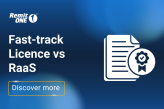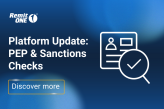Episode 2: How to Start a Money Transfer Business – A Practical Guide for Founders | The IPR Podcast August 7, 2025

The global cross-border payments industry continues to evolve, presenting new opportunities for remittance startups and financial institutions. But what does it really take to launch or expand a money transfer business in today’s landscape shaped by complex regulations, rising compliance expectations, and rapidly advancing technology?
In Episode 2 of The IPR Podcast RemitONE’s CMO Aamer Abedi sits down with Oussama Kseibati, Head of Business Solutions, to provide a clear, actionable roadmap for anyone looking to enter the cross-border payments space. Drawing from over 15 years of industry experience, Oussama outlines a five-step framework that founders can follow to build a compliant, scalable, and competitive Money Service Business (MSB).
Whether you’re launching from scratch or expanding into a new region, this episode offers foundational guidance to help you navigate the journey.
Understanding the Five Core Steps
Step 1: Research, Market Fit, and Business Planning
Every successful business begins with research. In the case of remittances, this means understanding your target corridors, your competition, your potential client base, and the unique value you aim to deliver. Oussama recommends starting small, focusing on one or two corridors you’re familiar with, perhaps tied to your own community or existing business network. This strategic focus allows you to manage cash flow, compliance, and relationships more efficiently before gradually expanding to new regions or services.
A well-structured business plan plays a key role in setting up for success. It should include realistic forecasting, cost structures, and clearly defined revenue streams, particularly understanding how FX margins and payout partnerships will contribute to your profit.
Step 2: Software That Meets Regulatory Needs
Technology is at the heart of modern money service businesses. From onboarding and identity verification to compliance screening and transaction processing, a reliable software infrastructure is essential. A robust platform should not only support regulatory needs (e.g. OFAC, UN, MAS, and HM Treasury checks) but also provide a seamless user experience for customers.
Oussama points out that choosing the right software provider can also give founders access to built-in integrations with payout partners, payment gateways, and compliance tools. Opting for an end-to-end platform such as RemitONE can reduce development time, streamline operations, and help ensure your system is aligned with regulatory requirements from day one.
Step 3: Apply for the Appropriate Licence
Depending on your jurisdiction and the nature of your services, you’ll need to apply for a financial licence, commonly known as an EMI (Electronic Money Institution) licence in the UK/EU, or equivalent.
Founders should consider their service model carefully:
- Do you intend to hold client funds in wallets?
- Are your transaction volumes expected to grow rapidly?
- Will you operate in a single country or multiple regions?
For many, a Small Payment Institution (SPI) licence offers a more accessible entry point. It allows you to operate legally while building up transaction history and operational credibility, which can later support applications for higher-tier licences like API or EMI.
Step 4: Secure a Client Bank Account
Opening a bank account for safeguarding client funds can be one of the more challenging steps, especially in regions where traditional banks view remittance providers as high-risk. This has led to a wave of “de-risking,” where financial institutions have withdrawn services from MSBs altogether.
However, there are solutions. Letters of intent from banks, demonstrating willingness to provide an account once licensed, can support your application with regulators. Additionally, new digital-first banks and fintech-focused institutions are becoming more open to MSB clients, especially those operating with transparency and good controls in place.
The client account ensures that funds remain protected until the transaction is completed, adding an extra layer of security for both regulators and customers.
Step 5: Partner with Reliable Payout Networks
Once you’ve established your business model, tech infrastructure, and licence, you’ll need to connect with payout partners such as banks, MTOs, or telcos in the payout country, who will complete the final end of the transaction.
Payout partners are critical for determining your transaction fees, exchange rates, and service reliability. In the early stages, pre-funding is common, meaning you’ll need to deposit funds in advance with these partners to enable instant payouts.
Here too, a well-connected technology provider can simplify the process by offering access to pre-integrated partners or facilitating introductions to established networks.
The Role of End-to-End Platforms in Supporting MSBs
Remittance businesses today require more than just a digital interface. A complete solution should connect every part of the remittance chain—from onboarding and KYC to payment gateways, FX providers, compliance systems, and settlement tools.
RemitONE’s platform, for example, supports founders throughout this journey by offering tools for transaction monitoring, sanctions screening, automated compliance, and built-in integrations with various payment partners. The goal is to give new entrants the ability to launch quickly, scale with confidence, and maintain compliance across jurisdictions.
Watch the full podcast for the complete insights and strategies.
YouTube: https://youtu.be/2GChfkdhaMg?si=aWj4NuQvRXl9Ly7W
Spotify: https://open.spotify.com/episode/3dAbpgiDWyKklj3Guteo2F?si=569b6d23ade94344
Apple Podcasts: https://podcasts.apple.com/us/podcast/how-to-start-a-money-transfer-business/id1822769031?i=1000718661978
If you’re exploring the possibility of launching your own MSB or expanding into new corridors, speak to one of our consultants. Book a free session here: https://calendly.com/remitone-oussama/free-30min-consultation-website
For questions or guidance, reach out to sales@remitone.com.
Related Posts
-

Upcoming Webinar: How Remittance Providers Can Unlock More Value From Every Transaction
Remittances is no longer just about sending money. Today’s remittance providers are under pressure to do more with every transaction, move faster, open new corridors,…
January 28, 2026 -

Episode 6: RaaS Explained – How Banks and Fintechs Can Expand Cross-Border Without Licensing
This year, something has shifted. Banks and large fintechs are no longer asking if they should expand cross-border—they’re asking how to do it faster? Reduce…
January 27, 2026 -

What the UK’s Fast-Track Licence Means for Fintechs Expanding Cross-Border
Expansion is a present-day requirement for banks and fintechs, but the routes to market are not one-size-fits-all. Fast-track or provisional licences can offer…
January 27, 2026 -

Update: Integrated PEP & Sanctions Lookup Checks
From 1 March 2026, we will introduce an integrated screening service that covers both sanctions and PEPs lookup checks for each transaction on the…
January 27, 2026 -

Cross-Border Payments AI-Powered Fraud Detection – Staying Ahead of Risk in 2026
Fraud in cross-border payments is evolving fast. Criminals are quick to exploit new technologies, leaving legacy systems struggling to keep up. For money service businesses (MSBs),…
December 3, 2025 -

Episode 5: Your 2026 Headstart – Trends, Predictions & Insights Shaping Cross-Border Payments
2026 is shaping up to be a year of rapid change, and standing still is no longer an option. The question…
December 3, 2025